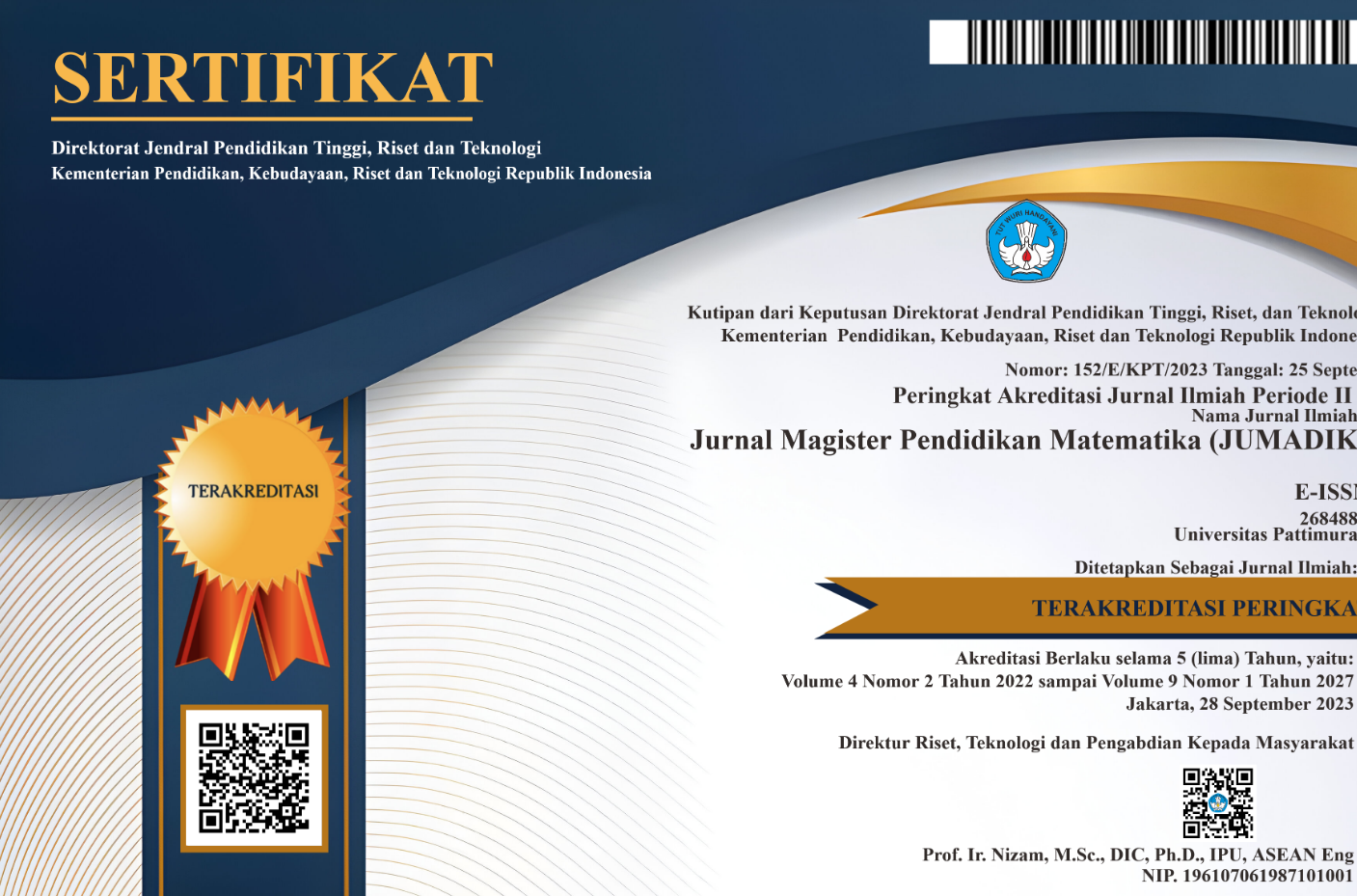PROSES BERPIKIR PESERTA DIDIK DALAM PEMECAHAN SOAL CERITA MATEMATIKA DITINJAU DARI GAYA KOGNITIF
Abstract
This study aims to describe the thinking process of students in solving mathematical problems of triangular and quadrilateral material in terms of cognitive style. The thinking process in this study is the steps taken by students involving mental activities in solving problems related to problem solving. The process of thinking in this study there are three kinds, namely conceptual thinking, semi-conceptual thinking and computational thinking. This research is a qualitative descriptive study. The subjects in this study were grade VII students consisting of four students with details of each two students from the Field Independent (FI) cognitive style and two students from the Field Dependent cognitive style (FD). Data collection techniques used in this study were mathematical tests and interviews. Data on the results of mathematical tests and interviews were analyzed based on indicators suitable with the conceptual thinking process, semi-conceptual thinking process and computational thinking process. From the results of data analysis, it was found that the students' thinking processes in solving mathematical story problems in the Field Independent group is the conceptual and semi-conceptual thinking processes. And students' thinking processes in solving mathematical story problems in the Field Dependent group tend to be semi-conceptual and computational thinking processes.
Downloads
References
Marpaung, Y. (1986). Proses Berpikir Siswa dalam Pembentukan Konsep Algoritma Matematis. Makalah Pidato Dies Natalies XXXI IKIP Sanata Dharma Yogyakarta, 25 Oktober 1986.
Moleong, Lexy J. (2017). Metode Penelitian Kualitatif. Bandung: Remaja Rosdakarya.
Nasution, S. 2011. Berbagai Pendekatan dalam Proses Belajar Mengajar. Jakarta: Bumi Aksara.
Ngilawajan, Darma Andreas. (2013). Proses Berpikir Siswa SMA dalam Memecahkan Masalah Matematika Materi Turunan Ditinjau Dari Gaya Kognitif Field Independent dan Field Dependent. Tesis. Universitas Pattimura.
Ratumanan, T. Gerson. (2003). Pengembangan Model Pembelajaran Interaktif dengan Setting Kooperatif (Model PISK) dan Pengaruhnya terhadap Hasil Belajar Matematika Siswa SLTP di Kota Ambon. Disertasi. Universitas Negeri Surabaya.
Someren, V., Maarten, W.Y.F.B., & Jacobijn A.C.S. (1994). The Think Aloud Method: A Practical Guide to Modelling Cognitive Processes. London: Academic Press.
Winkel, W.S. (1996). Psikologi Pengajaran. Jakarta: Gramedia.
Witkin, H.A., Moore, C.A., Goodenough, D.R., & Cox, P.W. (1977). Field-Dependent and Field-Independent Cognitive Styles and Their Educational Implications. Winter Review of Educational Research, Vol. 47 No. 1.
Zuhri, D. (1998). Proses Berpikir Siswa Kelas 11 SMPN 16 Pekanbaru Dalam Menyelesaikan Soal-Soal Perbandingan Senilai Dan Perbandingan Berbalik Nilai. Tesis. Surabaya: Pascasarjana UNESA.
Copyright (c) 2019 JUMADIKA: Jurnal Magister Pendidikan Matematika

This work is licensed under a Creative Commons Attribution-NonCommercial-ShareAlike 4.0 International License.
License and Copyright Agreement
In submitting the manuscript to the journal, the authors certify that:
- They are authorized by their co-authors to enter into these arrangements.
- The work described has not been formally published before, except in the form of an abstract or as part of a published lecture, review, thesis, or overlay journal. Please also carefully read Jurnal Magister Pendidikan Matematika (JUMADIKA) Posting Your Article Policy.
- That it is not under consideration for publication elsewhere,
- That its publication has been approved by all the author(s) and by the responsible authorities – tacitly or explicitly – of the institutes where the work has been carried out.
- They secure the right to reproduce any material that has already been published or copyrighted elsewhere.
- They agree to the following license and copyright agreement.
Copyright
Authors who publish with Jurnal Magister Pendidikan Matematika (JUMADIKA) agree to the following terms:
- Authors retain copyright and grant the journal right of first publication with the work simultaneously licensed under a Creative Commons Attribution-NonCommercial-ShareAlike 4.0 International License (http://creativecommons.org/licenses/by-nc-sa/4.0/) that allows others to share the work with an acknowledgment of the work's authorship and initial publication in this journal.
- Authors are able to enter into separate, additional contractual arrangements for the non-exclusive distribution of the journal's published version of the work (e.g., post it to an institutional repository or publish it in a book), with an acknowledgment of its initial publication in this journal.
- Authors are permitted and encouraged to post their work online (e.g., in institutional repositories or on their website) prior to and during the submission process, as it can lead to productive exchanges, as well as earlier and greater citation of published work.








